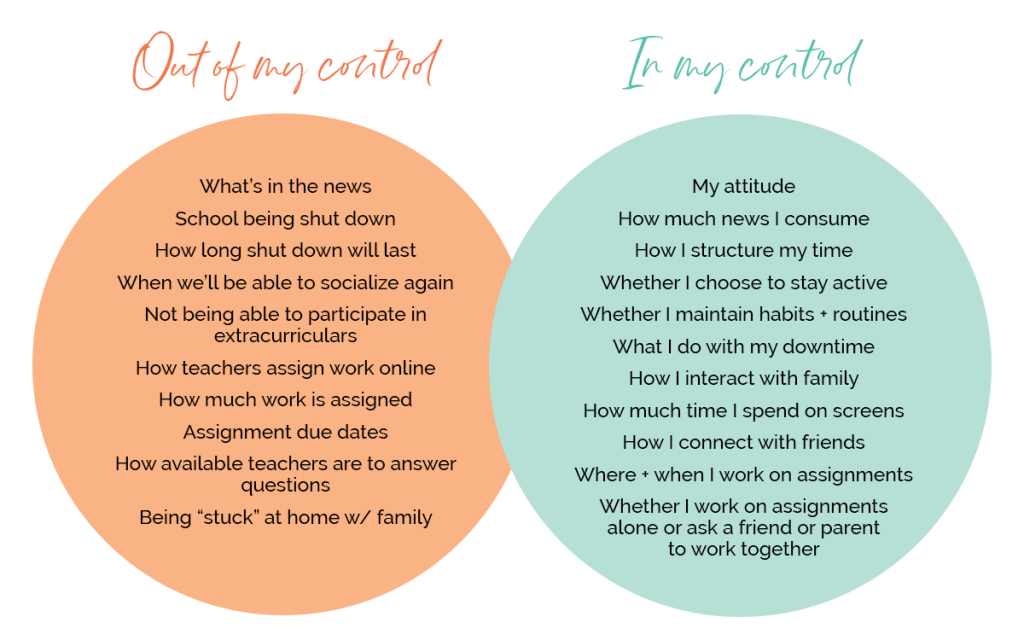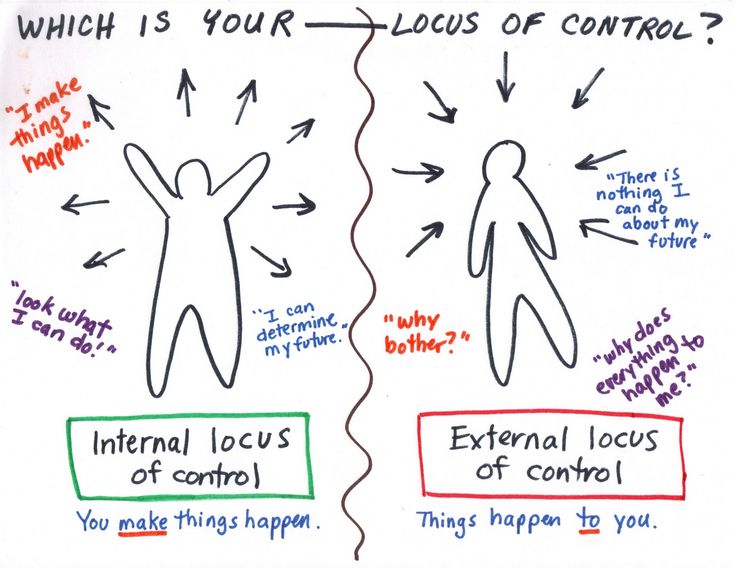
With all of the chaos and uncertainty around COVID-19 and the transition to online classes, a lot of students (and parents!) are feeling stressed and overwhelmed about everything that’s going on and how out of control it all feels.

In the face of such enormous changes, it’s easy for students to end up either…
- Feeling really anxious about how unpredictable everything is, worrying about what’s going to happen, and stressing about what is going to happen next and how long this shutdown will last.
- OR getting angry and upset about everything that is going on, resenting that things are happening the way that they are, and reacting to the changes with annoyance and irritation.
If students are getting stuck in either anxiety or anger, there is a good chance that they are focusing their attention on the aspects of the problem that are outside of their control.
While today’s current events are an extreme example, it can be very tempting for students to focus on things that are outside of their control in any difficult circumstance, including…
- Getting a bad grade on a test.
- Arguing with a friend.
- Facing a big, overwhelming deadline.
In these challenging situations, students have a fundamental choice…
- To focus on what is outside of their control, which makes it seem like they’re powerless to change the situation and leaves them feeling anxious, angry, or both
OR - To focus on the aspects of the situation that are inside their control, and take ownership for doing what they can to improve either the situation itself or their response to it.
Shifting Focus
One tool that we like to use with our students to help them practice adopting a more helpful perspective in these challenging situations is by drawing a Venn Diagram, with one circle showing what’s inside of their control, and another showing what’s outside of their control:

Drawing and filling in these circles can help students recognize that for every situation in their life, there will always be some aspects of the situation they can’t control and others that they can.
When students look at the two circles side by side and consider how they feel when they focus on each of them, they can start to see that focusing more on the things that are outside of their control generally makes them feel more helpless and frustrated, whereas focusing more on what’s inside their control puts them back in the driver’s seat and gives them a greater chance of actually being able to reach their goals.
Ultimately, our long-term goal with this practice of shifting students’ focus from one circle to the other is to help them start to develop more of an internal locus of control.
Internal vs External Locus of Control

An internal locus of control is the belief that one’s life events and experiences (good and bad) are greatly influenced by personal factors such as one’s attitude, preparation, efforts and actions. These are the people who believe that they make things happen and have the power to determine their future.
An external locus of control is the belief that one’s life events and experiences (good and bad) are mostly caused by forces outside of their control, such as the environment, other people. These are the people who believe that things in life happen to them, and feel like they do not have the power to change how the results turn out.
As we saw in the Venn diagram above, there are always both external and internal factors contributing to the outcome of a situation. But generally, students who adopt more of an internal locus of control have better attitudes, put in more effort, and tend to be more successful in school.
After all, if a student truly believes that they are completely helpless, stuck in quarantine, with too many assignments to get done, not enough access to resources, and are defensively blaming these problems on issues outside of their control, they are more likely to accept defeat before even trying.
But if that student can instead shift their focus to the fact that they have an unprecedented ability to control when and how they do their work, how much time and energy they spend on their assignments, who and how and when they ask for help, and their own attitude and response to the situation, they will feel a much greater sense of autonomy and control and have a far better chance at coming out of the COVID crisis feeling more confident, and having higher grades in their classes.
Action Steps:
- Apply this concept to a challenge or issue your teen is currently dealing with, by drawing a venn diagram like the one above, helping them consider what is outside of their control and inside their control in this situation, and reflecting on what they notice about the way they feel and how they want to respond when they focus on what’s outside of their control vs. inside of their control.
- Download our locus of control quiz below and have your student take it, then talk about the results together. To what extent do they feel like their life is largely in their control versus out of their control? Do they usually feel like most things happen to them, or do they feel like they are the one making things happen?

About The Author
Dr. Maggie Wray is a certified ADHD Coach & Academic Life Coach with a Ph.D. in Neurobiology and Behavior from Cornell and a Bachelor’s degree in Astrophysics from Princeton. She founded Creating Positive Futures in 2012 to help high school and college students learn how to earn better grades with less stress. Her team of dedicated coaches is on a mission to empower students to develop the mindset, organization, time management, and study skills they need to achieve their goals.
Related Posts
Other Posts You May Enjoy
How Does Your Teen Handle Failure?
How do you feel about failure?Most of us aren’t crazy about it. But at some point, no matter how hard we try, we’re going to fail at something. So, it’s important to consider how to respond to failure when it does happen, and how to improve our resilience so we’re…
Optimistic students earn better grades
Is your student more of an optimist, or a pessimist? Studies have shown that optimists experience a number of benefits later in life, as compared with their more pessimistic peers, including… Better test scores and higher GPAs Lower levels of stress, anxiety, and…
Starting before you’re motivated
Most students want to do well in school. But wanting to do well doesn’t guarantee they will feel motivated to work on assignments in the moment. Even students who usually get good grades have days when they just don’t feel like doing homework or studying for their…




